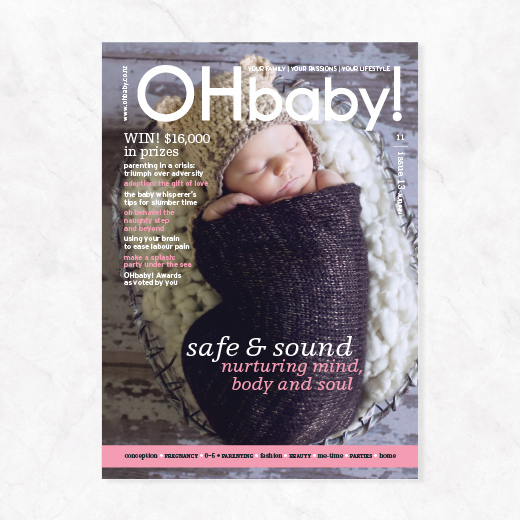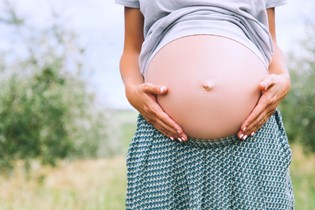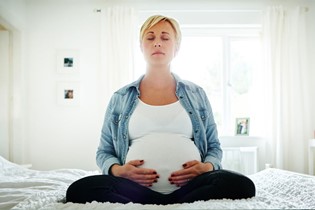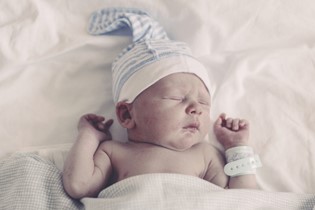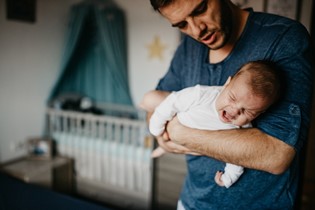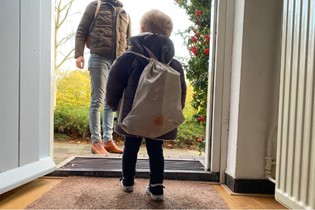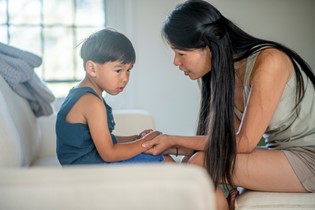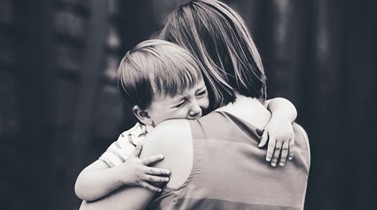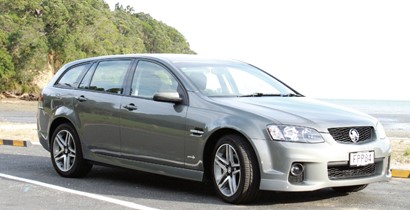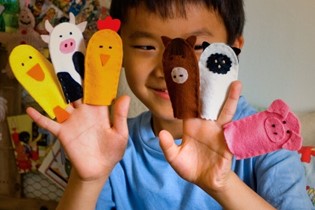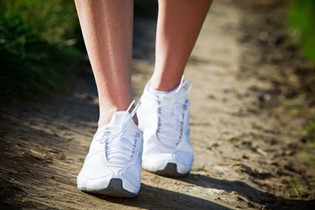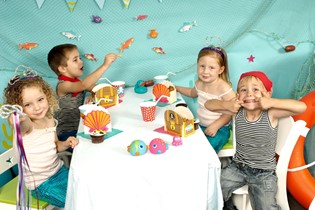When disaster strikes: coping after the earthquakes
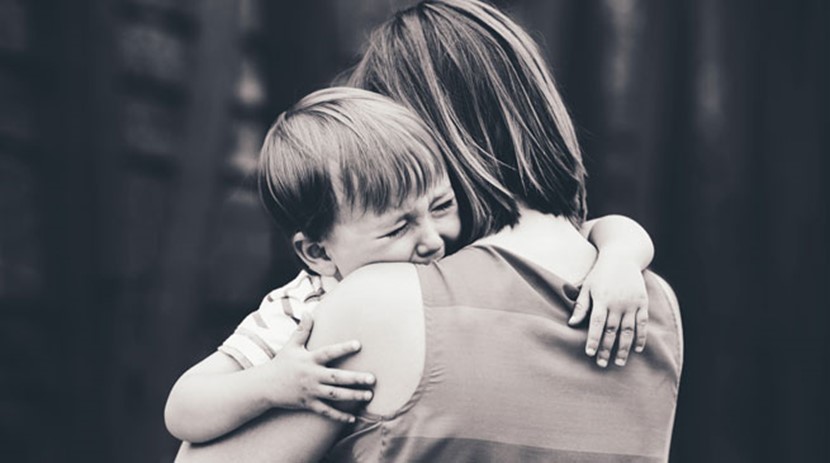
Emotional shock waves from the Christchurch earthquake will be felt throughout New Zealand for months to come. Psychologist Dr Melanie Woodfield offers advice to help you and your children cope.
The earthquake that rocked Canterbury on February 22 sent shock waves of fear and disbelief throughout our nation. Despite the September 2010 quake, most of us thought that it wouldn't, or couldn't, happen again.
Immediately after the earthquake, various experts gave helpful suggestions as to how to support some of the most vulnerable members of our society, our children. But as the weeks pass, the suggestions fade away, but the challenges often linger. We're left with kids who won't leave parents to go to school or kids who burst into tears at the thought of returning to the place where they were when the earthquake happened. Children who have started thumb-sucking, bed-wetting, baby talking or who stick to Mum like glue. Or perhaps we're faced with relocating to a new home and trying to manage the upheaval that often goes with moving house, on top of the earthquake.
What's normal… and what's not
It's absolutely normal for a catastrophe such as the Christchurch earthquake to bring about a change in our behaviour, whether we experienced it first-hand or heard about it through the media. It's normal to feel a sense that things are somewhat surreal and to feel agitated or on edge. Many adults feel a sense of needing to draw near to loved ones - giving hubby an extra cuddle or spending longer than usual snuggling the kids. For children, it's quite common to regress with their development when Some children, particularly boys, might behave more aggressively or be more disorganised. Again, this can be a distressed child's way of expressing anxiety and fear when he can't find the words. These behaviours usually become less frequent as the child begins to feel more comfortable, but there are no rules for how long it will take. This varies according to the child's temperament (for example being shy or clingy before the earthquake) and other factors.
These behaviours usually become less frequent as the child begins to feel more comfortable, but there are no rules for how long it will take. This varies according to the child's temperament (for example being shy or clingy before the earthquake) and other factors.
Numerous studies have been carried out on how well different children fare following earthquakes around the world. This information allows us to highlight which children are more vulnerable to poor psychological outcomes (such as Post-traumatic Stress Disorder [PTSD], other anxiety disorders or depression). Various studies have shown certain children are more vulnerable to developing PTSD. These children are:
- Younger (Endo, Shioiri, & Someya, 2009)
- Female (Zhang et al., 2010)
- Specifically worried about damage to their houses (Endo, Shioiri, & Someya, 2009)
- Felt that their life was in danger during the earthquake (Giannopoulou, Strouthos, Smith, Dikaiakou, Galanopoulou, & Yule, 2006)
- Were closer to the quake's epicentre (Groome & Soureti, 2004)
- Were alone at the time of the quake (Kolaitis et al., 2003)
- Sustained injuries during the earthquake (Kolaitis et al., 2003)
- Had an anxiety disorder before a quake (Asarnow et al., 1999)
Just to emphasise, children who "fit" the points on this list will not necessarily develop PTSD. There is a very complex relationship between these factors, children's temperament, coping styles, family background and support following the quake.
It's important for parents throughout New Zealand, not just Christchurch, to monitor children for signs of distress, especially now that some time has passed since the earthquake. The shock waves from the earthquake will be felt both literally and figuratively throughout New Zealand. The quake has a severe effect on family finances and stress levels. Following the September 2010 quake, news reports highlighted increases in family violence. These factors obviously have a huge impact on children, who might otherwise have fared well.
Children's responses to the fear and uncertainty surrounding the earthquake can be moderated by our own responses, by a process known as "maternal buffering".
Miriam McCaleb, an educator of children and adults and a presenter for the Brainwave Trust writes a fascinating blog which can be found at baby.geek.nz. In this blog, Miriam wrote about her experiences as the mother of a young child during the Christchurch quake, and linked it to her knowledge of early brain development. She outlined research by Professor Megan Gunnar from Stanford University, California, in which Professor Gunnar visited a childcare centre and took saliva samples to measure the stress hormone cortisol. One day there happened to be a fire and the children and staff were all evacuated. According to Miriam's blog, "the teachers projected an image of calm efficiency but their rates of cortisol were through the roof. The children's cortisol was not much affected. The adults were demonstrating maternal buffering - their more sophisticated stress response systems were taking the slack on behalf of the immature brains of their charges. With their teacher-y voices and policies folders, they made everything on the outside as okay as it could be, while their biology hijacked their professional veneers, ratcheting up the cortisol and making emotions especially amplified."
What's going on in our heads?
After an event such as this, where our lives have been threatened, our minds slip into a constant state of alertness. This serves the function of giving us early warning of future threats, which can be helpful.
Unhelpfully, when our minds are so active, it means we can have trouble sleeping and concentrating, be easily frightened by non-threatening noises and feel constantly "on guard". This can be physically and emotionally exhausting.
Sometimes, we feel driven to actively avoid thinking about the earthquake, or anything linked to the earthquake. We might lose a portion of memory of the earthquake itself, feel numb or disconnected from others, or even feel a sense of "zoning out" from life.
We may feel compelled to re-experience the earthquake by talking lots about it. Or we suffer from intrusive memories that pop into our mind at unpredictable times - nightmares, fLashbacks, feeling as though it's all happening again or being upset when reminded of the earthquake. It's likely that the kids will try to talk about the earthquake, if they haven't already. Older children seem to feel compelled to talk about the trauma, but often have diffIculty doing this. Younger children may act out their experiences through play - drawing or acting out the earthquake.
There are several different theories or models for understanding how we usually respond to trauma. A popular theory involves Classical Conditioning. According to this theory, for almost everyone, the earthquake brought on an intense unpleasant reaction that involved fear, helplessness and horror. All sorts of things were happening at the time, externally and internally. Both these external and internal cues can become linked to the fear, helplessness or horror. Experiencing one or more of the external or internal cues in the future can then bring on the fear, helplessness or horror. For example:
- A child who was going to the toilet at the time of the earthquake develops an intense fear of toilets.
- Returning to the place you were during the quake produces intense emotions.
Behavioural psychologists argue that repeatedly "experiencing" the earthquake by remembering it or talking about it, while in a safe environment, is the key to healing.
For most of us, this happens naturally through conversations with family and friends. Some of us need professional help, where we can talk through our responses in a supported setting. Experiencing a couple of these symptoms doesn't mean you're bonkers. It means your mind is having an absolutely normal reaction to a hugely stressful event. But if you're noticing lots of these symptoms lots of the time, and you're having trouble getting through the day, it's worth seeking some help.
The good news is that PTSD, and most anxiety disorders, usually respond well to treatment. If you're worried about your child, your partner or yourself be encouraged to talk to a professional. The destruction caused by the earthquake was devastating enough let alone having to cope with an internal turmoil.
Kia kaha, Christchurch.
A world turned upside-down
Like so many in Christchurch, Claire Smith and her family were left homeless by the earthquake. The family has displayed some of the signs of distress as discussed in this article, but bear in mind these may well be "normal" reactions to an "abnormal" situation. Read below Melanie Woodfeld's response as she helps Claire to help her family recover from the trauma.
Claire Smith was at the Redcliffs New World in when the quake struck. Josh, two and a half, was in the double buggy as shelves of wine crashed to the floor just in front of him, followed by the magazine racks.
Claire had just picked up Josh from crèche and Caitlyn, three and a half, from kindy. She immediately swung around to leave the store, passing on the way out a woman who had fainted. Outside she looked towards the school and saw a plume of dust rising where part of the cliff face had come down.
"People were walking around shocked, not really doing anything, just looking," she says.
Josh was so shocked he didn't speak for an hour.
They made their way back to the kindergarten to wait out the expected after-shocks but a short time later a woman came in warning of a tsunami. Panicked, Claire and the kids left the buggy and groceries to get a lift up the hill to their house. But as she approached, Claire could see her home of three years was uninhabitable.
They waited at the neighbour's - an agonising wait after Claire realised her husband was at a conference in the CBD. It was two hours before they could make contact by text. That night the family joined thousands of others leaving town. They spent a night in Geraldine, south Canterbury, before heading to Waitati, north of Dunedin, to the home of a friend of Claire's brother. The friend moved out so they could have the two-bedroom place to themselves.
"People were just amazing. They were knocking on our door, dropping off toys, clothes, chocolate," says Claire.
However, the house was beside a railway line and each time a train went past Josh would become hysterical.
"The kids connected trains with something scary too."
After three nights they moved to a sleep-out in Dunedin and then to a friend's holiday house in Twizel.
A week after the earthquake, Claire said the family was treating the experience as a holiday and a chance to catch up and play with cousins and friends along the way. A trip to Surfer's Paradise had been brought forward and the family was to leave 10 days after the quake.
Claire says Caitlyn was able to joke about the earthquake and talked about it a lot but Josh was still anxious.
"He's mentioned a few things but gets a pretty worried face when we mention it," says Claire.
Her husband, Craig, a medical sales rep for the South Island, will keep his job but was feeling bad about not being able to provide stability and security for his young children.
Claire herself says her main feeling is sadness for the community of Redcliffs that she and her family had formed close ties with, and sadness over the possibility the family will not be able to move back there.
"I have to say I'm scared about the future and worried about another earthquake happening in Christchurch."
Melanie's response:
Dear Claire,
What an incredibly frightening experience for you and your family. I hope that the following response to your experiences will be helpful in some way.
To start with, returning to the kindergarten was a psychologically savvy move. In times of distress, familiar surroundings can really help. Having said that, a holiday away from the physical reminders of the earthquake and news reports can be just what the doctor ordered.
Once you're settled try to resume crèche and kindy as soon as possible. The kids may be reluctant, but a gentle return to routine is important.
Try to be aware of your own responses to the earthquake, especially in front of the kids. A large body of research suggests that how well children do after experiencing a trauma is closely linked to how well parents cope. Children literally look to us for how to cope, and will gauge how serious the situation is from how stressed we are. Even if the children seem oblivious chances are they're watching you! Interestingly, children are often frightened of things that don't make sense to adults. I've talked to children in therapy following a life-threatening situation who have explained they're worried whether their pet rabbit has been fed, or whether their collage on the kindy wall will be okay.
It's best to wait until the kids are asleep before talking about the big stuff like living arrangements. Parents are just as vulnerable as children to post-earthquake emotional turmoil. If your own buttons are pressed while the kids are around, try to explain what's going on for you. This will help them find words to explain their own feelings.
I'm a big fan of age-appropriate honesty when it comes to answering the "big questions" that will inevitably come. When kids ask if there will be another quake, try to tailor your answer to their developmental level. Try not to offer blanket reassurance that everything will be okay, but reassure the kids that they're loved and that they are safe at that time.
Kindest wishes, Melanie.
Dr Melanie Woodfeld is a child and adolescent clinical psychologist. She lives in Auckland with her husband and two young boys.
Further information:
* The New Zealand Psychological Society has produced an excellent info sheet: "Life After Earthquakes", which can be downloaded from http://www.psychology.org.nz/cms_show_download.php?id=559
* The KidsHealth website, produced by the Paediatric Society of New Zealand and the Starship Foundation, have adapted this document and added information about support services. See "Coping with a Natural Disaster" at http://www.kidshealth.org.nz/index.php/ps_pagename/contentpage/pi_id/482
References:
Asarnow, Joan; Glynn, Shirley; Pynoos, Robert S; Nahum, Jennifer; Guthrie, Donald; Cantwell, Dennis P; Franklin, Brenda (1999). When the earth stops shaking: Earthquake sequelae among children diagnosed for pre-earthquake psychopathology. Journal of the American Academy of Child & Adolescent Psychiatry 38(8), 1016-1023.
Endo, Taro; Shioiri, Toshiki; Someya, Toshiyuki, (2009). Post-traumatic symptoms among the children and adolescents 2 years after the 2004 Niigata-Chuetsu earthquake in Japan. Psychiatry and Clinical Neurosciences 63(2), 253.
Giannopoulou, Ioanna; Strouthos, Marios; Smith, Patrick; Dikaiakou, Anastasia; Galanopoulou, Vasiliki; Yule, William, (2006). Post-traumatic stress reactions of children and adolescents exposed to the Athens 1999 earthquake. European Psychiatry 21(3), 160-166.
Groome, David; Soureti, Anastasia (2004). Post-traumatic stress disorder and anxiety symptoms in children exposed to the 1999 Greek earthquake. British Journal of Psychology 95(3), 387-397.
Kolaitis, G; Kotsopoulos, J; Tsiantis, J; Haritaki, S; Rigizou, F; Zacharaki, L; Riga, E; Augoustatou, A; Bimbou, A; Kanari, N; Liakopoulou, M; Katerelos, P. (2003). Posttraumatic stress reactions among children following the Athens earthquake of September 1999. European Child & Adolescent Psychiatry 12(6), 273-280.
Zhang, Yan; Kong, Fanchang; Wang, Lin; Chen, Hong; Gao, Xiao; Tan, Xiaohong; Chen, Han; Lv, Jianguo; Liu, Yong (2010). Mental health and coping styles of children and adolescent survivors one year after the 2008 Chinese earthquake. Children and Youth Services Review 32(10), 1403-1409.

AS FEATURED IN ISSUE 13 OF OHbaby! MAGAZINE. CHECK OUT OTHER ARTICLES IN THIS ISSUE BELOW
